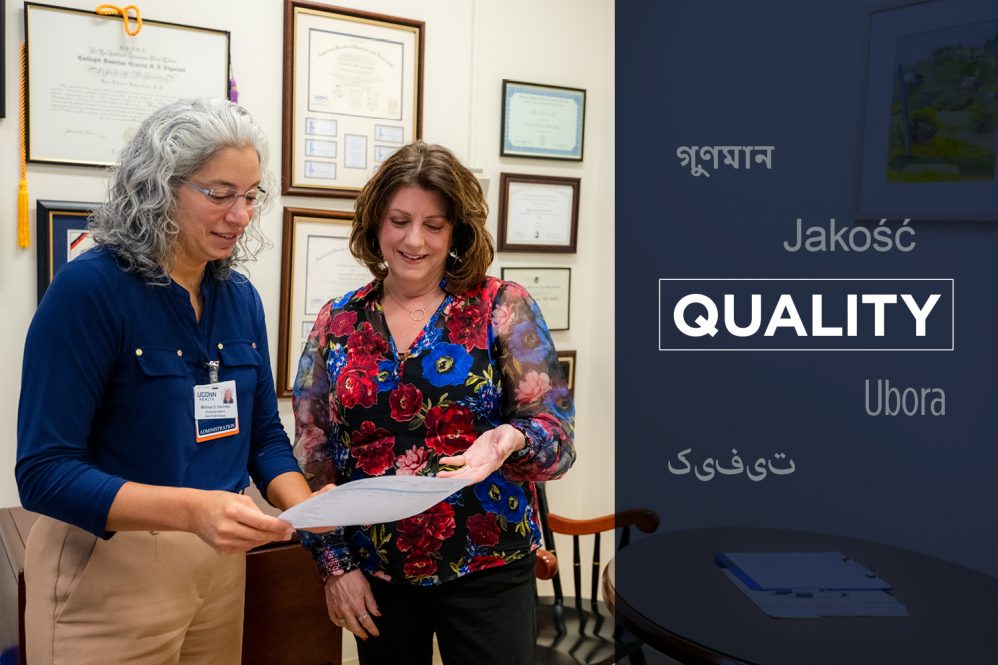UConn Health's New Chief Quality Officer, Dr. Melissa Henretta and Michelle DeLayo DNP, APRN, ACNP-BC, who has a long history in the Quality Department, talk about the importance of quality and how we work toward this important goal.

The Institute of Medicine defines health care quality as care delivery that is safe, effective, efficient, equitable, timely, and patient centered. UConn Health has a team of quality experts that work with the common goal of improving the quality of care provided to our patients.
Melissa Henretta MD, MPH, who joined UConn Health in May of this year in her role as Chief Quality Officer and director of the Division of Gynecologic Oncology, focuses on improving patient outcomes, implementing best practices in care, and fostering a culture of safety and excellence. Michelle DeLayo DNP, APRN, ACNP-BC, who has been at UConn Health since 1992 with her extensive background in nursing and critical care, brings a wealth of experience to the Quality Department, in her role as Nursing Director since 2018. Both are dedicated to improving healthcare standards and ensuring that patients receive the highest level of care.
Henretta's perspective on quality reflects a deep understanding of how comprehensive and continuous quality improvement must be in healthcare. She emphasizes that quality isn't solely about achieving a Leapfrog grade-a popular benchmark for hospital safety-but about the numerous underlying factors that contribute to excellence in care. This approach helps ensure that improvements in quality are deeply ingrained in the system and not just superficial changes to meet external benchmarks.
DeLayo highlights that UConn Health's quality management system encompasses all these components from the Institute of Medicine, demonstrating a well-rounded approach to patient care. Having a team specifically dedicated to overseeing clinical outcomes through the lens of the six domains allows the institution to identify areas of opportunity and improve upon the care provided.
Henretta notes that the entire UConn Health quality team is unified in their commitment to improving patient safety and quality. This shared mission creates a supportive environment where everyone, from doctors to nurses to administrative staff, is aligned on the same purpose-providing the best possible care for patients. She believes transparency is the key, reporting events as they occur to learn from those events, and understanding that patient care is improved when we are honest and transparent with ourselves and the programs we participate in.
"Our hospital so believes in the importance of patient safety and quality that we have a daily multidisciplinary meeting to identify potential issues and problem-solve across services, for our hospital and patients," says Henretta. "By discussing both safety concerns and quality of care on a regular basis, the team can proactively address challenges, reduce risks and enhance patient outcomes."
DeLayo underscores the critical role that senior leadership plays in healthcare quality. The fact that the leadership at UConn Health values and understands the importance of quality initiatives allowed the quality department to move forward with significant projects, such as the sepsis quality nurse program.
This backing ensures that quality measures are prioritized and receive the necessary resources for implementation. For example, in 2018 DeLayo and the quality team identified concerns surrounding optimal care for sepsis patients. By approaching leadership with a well-thought-out plan, they were able to secure the support needed to implement changes introducing a specialized program to improve the care of sepsis patients. As a result, UConn Health has reduced readmissions and mortality, and compliance with the CMS SEP-1 core measure has improved from 28% in 2019 to 76% in 2023 and is currently 79% for Quarter 1 of 2024.
Both Henretta and DeLayo agree that any discussion about quality and safety would be remiss not to mention Dr. Scott Allen, Chief Medical Officer, who was the first Chief Quality Officer for UConn Health. He highlighted the importance of quality at UConn Health and has a deep institutional knowledge. Through his hands-on approach, he motivates others to continuously strive for improvement.
"We are making sure our patients obtain the same care that we would want our loved ones to obtain," says Henretta.






